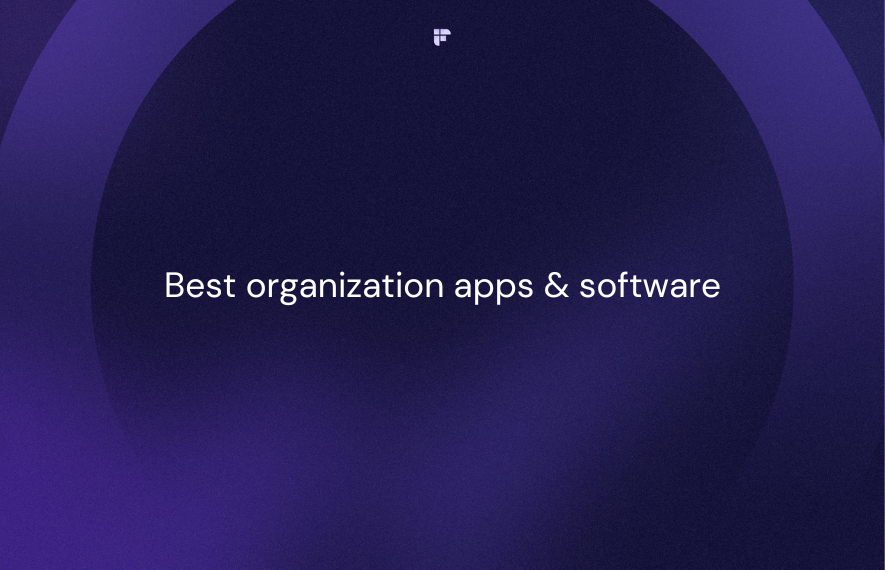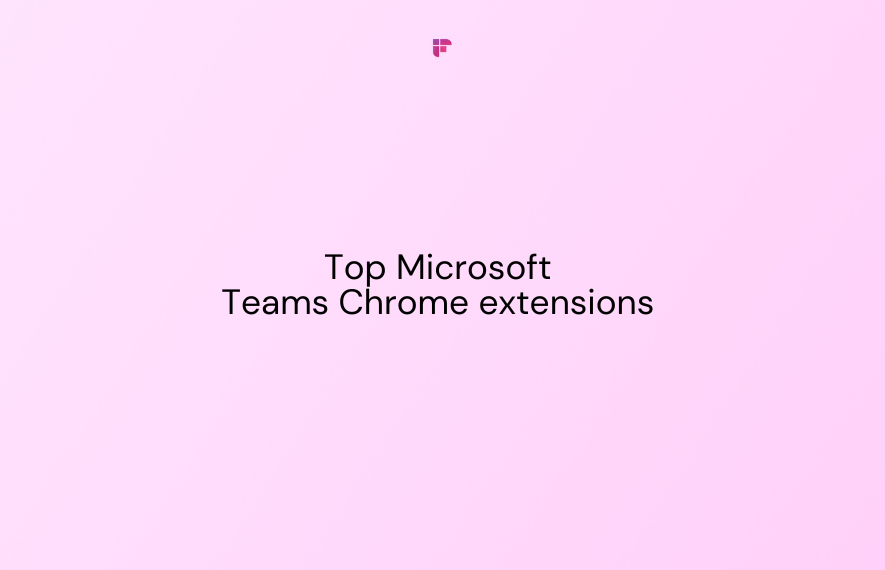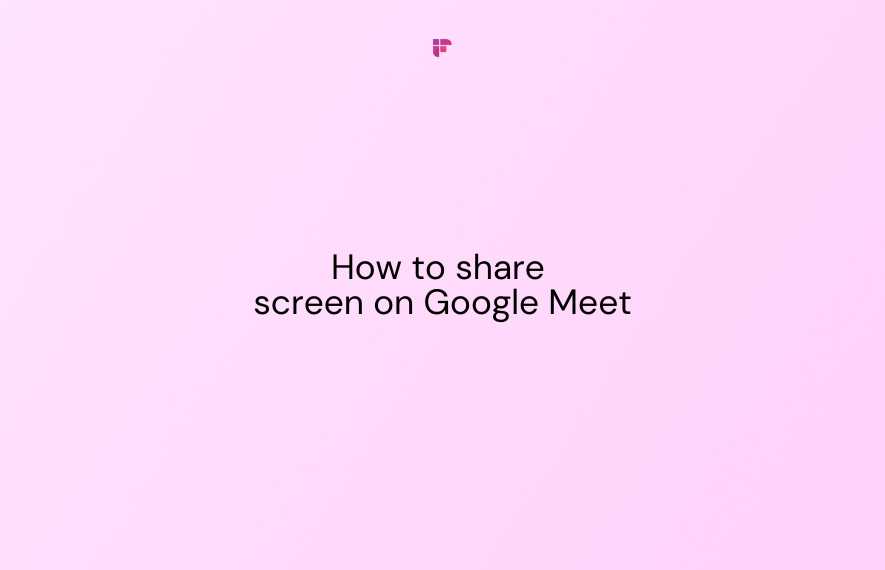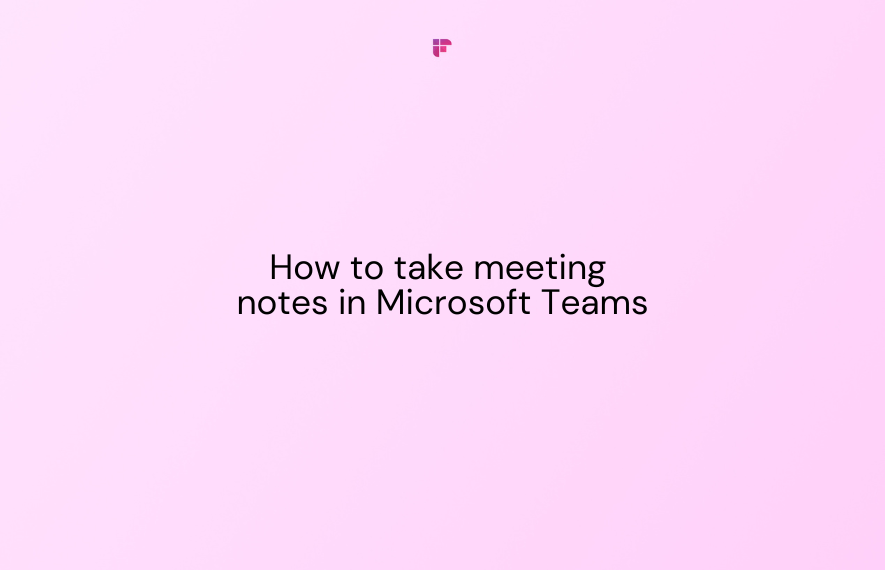Staying organized can be difficult, with so many tasks, projects, and information to track. And while many organization apps are available, finding the right solutions for your needs can feel overwhelming.
This comprehensive guide breaks down the 12 best organization apps based on core organizational needs:
- Note-taking
- Project management
- Meeting management
- General organization
Let’s dive in to bring order to your days.
Overview: Best organization apps in 2024
Best note-taking Apps:
- Fireflies.ai: AI-powered meeting assistant that can transcribe, summarize, and analyze conversations with over 90% accuracy.
- Evernote: Digital notebook for capturing notes, images, audio, etc., offers templates and integrations.
- Airtable: Blends spreadsheets, databases, and cards into one flexible cloud collaboration tool.
Best project management apps:
- ClickUp: All-in-one workspace combining tasks, docs, chat, goals, etc. Highly customizable.
- Monday.com: Visual project management with intuitive dashboards. Great for oversight.
- Asana: Excellent basic project tracking. Simple enough for everyday users.
Best meeting management apps:
- Calendly: Automates scheduling by letting people book meetings based on their availability.
- Google Calendar: Widely used default calendar. Well integrated with other Google apps.
- Geekbot: Replaces status meetings with automated prompts and updates.
Best organization apps:
- Notion: An extremely flexible and customizable framework to organize databases of notes, calendars, spreadsheets, and more.
- Google Drive: Simple, free cloud storage to organize files across devices.
- LastPass: Securely stores passwords and credentials and auto-fills login forms.
Now, let’s take a deep dive into each organization app category-wise.
Best organization apps for note-taking
1. Fireflies.ai
The average person juggles 8 meetings per week. And those in management or executive roles often attend many more. In addition, studies indicate we forget 50% of what's discussed as soon as the meeting ends.
Enter Fireflies.ai!
Fireflies.ai is not your average note-taking app. It's an AI-powered meeting assistant designed to record, transcribe, summarize, and analyze your voice conversations and meetings without you needing to lift a pen.
Fireflies works on all major video conferencing platforms like Zoom, Google Meet, Microsoft Teams, and Webex. It also offers a mobile app to record and transcribe unlimited offline conversations.
Pros:
- Get over 90% accurate transcripts for over 60+ languages, including Portuguese, Spanish, French, Arabic, German, Dutch, Hindi, and Italian.
- Customize meeting summaries that cater to your preferences.
- Organize your meeting into Channels for different teams or categories like sales, HR, marketing, etc.
- Create small, sharable sound bites from meetings and organize them into Playlists.
- Integrate with over 40+ tools, including CRMs, project management platforms, dialers, etc.
- Upload and transcribe previous meeting recordings or audio/video files.
- The GPT-4 powered chatbot Askfred answers all your post-meeting questions. Get insights or create follow-up emails, social media posts, blogs, and more.
- Review the transcript with Smart Search filters like questions, metrics, date and time, etc.
- Get conversation analytics, including the total number of conversations, time spent in meetings, questions asked, filler words used, sentiment analysis, conversation sentiments, talk-to-listen ratio, and more.
- Track different topics across conversations using Topic Tracker.
- Forget worrying about security concerns with end-to-end encryption. Fireflies is SOC 2 Type II, GDPR, and HIPAA compliant.
Cons:
- Primarily designed for capturing spoken conversations. Doesn’t offer manual text-based note-taking.
- Requires internet connectivity.
Pricing:
Fireflies provides an expansive free plan, granting 800 minutes of storage and unlimited transcriptions for meetings; some conditions apply, which you can read here: How to get unlimited meeting transcripts in Fireflies' free plan
If you want more features and unlimited storage, Fireflies offers affordable plans starting at $10/month/seat.
2. Evernote
Evernote makes taking, organizing, and sharing notes simple using various formats like text, sketches, and audio. Offline access ensures you can take notes anywhere.
It also offers integrations across leading productivity apps. Your notes stay securely connected to the relevant projects inside tools like Slack, Teams, G Suite, and more.
For team collaboration, Evernote expands capabilities further with networked note-taking, enabling centralized knowledge management.
Pros:
- Flexible capture formats: text, handwritten, dictation, whiteboards, and photographs.
- Ready to use note-taking templates across calendars, to-do lists, daily/weekly planners, journals, goals, etc. You can also create custom templates.
- Add tags to notes for different categories.
- Image recognition to enhance text search capabilities.
- Access data offline.
- Add your work files and PDF documents to your notes.
- Capture full-page articles, images, or selected text with the web clipper extension.
- Create and organize tasks by projects, due dates, and priority.
- Assign tasks to others and track their progress.
- Security measures like two-factor authentication, SOC 2 compliance, and data encryption.
- Seamless notes and data sync across multiple devices.
Cons:
- The free plan has storage and functionality limitations.
- Rising subscription costs
- Reduction of available features
- Sluggish customer support response times
Pricing:
- Free
- Personal - $10.83/month/, billed annually
- Professional - $14.17/month/, billed annually
- Teams - $20.83/user/month/, billed annually
3. Airtable
Airtable revolutionizes traditional note-taking by seamlessly blending tables, cards, and databases into a single, highly adaptable cloud collaboration tool.
Its intuitive interface resembles familiar elements like Excel or Google Sheets. But it allows you to visualize your data—Kanban boards, calendars, charts, graphs, etc. You can automate workflows across teams with formula support.
Airtable also offers a Notes app template to create and organize notes under different stacks.
Pros:
- Create custom fields, views, and workflows to organize your notes exactly how you need them.
- Unlike plain text notes, Airtable lets you view your information in Kanban boards, calendars, charts, and more, providing a more intuitive and engaging way to understand your data.
- Templates for different types of databases and projects.
- Automate repetitive tasks like tagging, categorizing, and moving notes with Airtable's formula support.
- Collaborate and share notes with teams, assign tasks, and track progress.
- Integrate with tools like Google Drive, Slack, and Zapier to create better workflows.
Cons:
- Airtable's flexibility has a steeper learning curve than simpler note-taking apps.
- If you only need a basic note-taking app for jotting down quick thoughts or ideas, Airtable is not ideal.
- Expensive paid plans compared to other note-taking apps.
Pricing:
- Free
- Team - $20/user/month/, billed annually
- Business - $45/user/month/, billed annually
Best organization apps for project management
4. ClickUp
Imagine ditching multiple tools for tasks, chats, goals, and document management. ClickUp combines all these functionalities and more into a streamlined workspace.
It allows both hierarchical project management and independent task management. Teams can create tailored views of their notes to suit specific preferences, requirements, or work styles. With various options, including personalized dashboards, tag-filtered task lists, calendar schedules, Kanban boards, mind maps, and more, ClickUp offers ample flexibility.
Pros:
- Centralization through ClickUp enhances communication, transparency, and oversight across organizations with data-enhanced analysis.
- Supports integrations including Slack, Dropbox, GitHub, and Zapier.
- Consolidates documents, spreadsheets, chat, and tasks in one place.
- Fully customizable views as per your preferences.
- Seamless team collaboration with features like task tracking, real-time updates, discussions, comments, and shared documents.
Cons:
- Due to its vast feature set, ClickUp has a steeper learning curve than simpler project management tools.
- According to a few users, the interface is not user-friendly.
- The free tier only offers 100MB of storage.
- Limited mobile app functionality.
Pricing:
- Free
- Unlimited - $7/user/month/, billed annually
- Business - $12/user/month/, billed annually
- Enterprise - Custom pricing
5. monday.com
Smooth centralized overview makes monday.com feel truly special for teams managing multifaceted projects.
Customizable dashboards present clear birds-eye views into the team’s workflows. monday.com makes creating and tailoring project views simple and visually intuitive for everyone.
For larger enterprises managing complex or distributed teams and dealing with numerous organizational challenges, monday.com elegantly simplifies and elevates operations.
Pros:
- The visual interface is easy to use and learn, even for those new to project management tools.
- Seamless collaboration through real-time updates, discussions, comments, and file sharing.
- monday.com integrates seamlessly with popular tools like Slack, Google Drive, and Zapier, enabling workflow connections and task automation to enhance productivity.
Cons:
- While offering customization options, monday.com isn't as flexible as ClickUp in creating custom fields, views, and automation.
- Limited mobile app functionality.
Pricing:
- Free
- Basic - $9/user/month/, billed annually
- Standard - $12/user/month/, billed annually
- Pro - $19/user/month/, billed annually
- Enterprise - Custom pricing
6. Asana
Asana offers powerful project tracking and coordination without overwhelming everyday users with numerous features. Its clean task interfaces cater to workers of all skill levels.
Building project plans, creating tasks, defining milestones, getting reminders, gauging progress, and understanding individual workloads become easy through Asana. Custom fields and templates further enhance efficiency, tailored to each team's workflow.
Pros:
- Streamlines project planning and monitoring with customizable task management, collaboration tools, and reporting features.
- Better collaboration through comments, file sharing, and @mentions enables effective team communication.
- Advanced features like task dependencies, milestones, due dates, and progress tracking.
- A workflow builder to create custom automated processes.
- The mobile app provides most desktop functionalities.
Cons:
- The simplicity of Asana comes at a cost. Compared to ClickUp and monday.com, it offers fewer customization options.
- Asana lags behind competitors in terms of powerful automation capabilities.
- Personal and Starter tiers lack time tracking.
Pricing:
- Personal - Free
- Starter - $10.99/user/month/, billed annually
- Advanced - $24.99/user/month/, billed annually
Best organization apps for meetings
7. Calendly
Calendly simplifies meeting scheduling, sparing professionals from the headache of endless email exchanges to find the right time. Just generate your customizable meeting link and share it to let others pick an available time slot.
The platform's round-robin feature avoids the issue of double-booking by presenting individual time slots to each user, ensuring a smooth scheduling experience.
Pros:
- Simple and intuitive interface, making it easy to set up your availability and create customizable scheduling links.
- You can define different meeting types with varying durations, buffer times, and locations.
- Integrates seamlessly with various calendars, including Google Calendar, Outlook, and iCloud to ensure updates and events are synced across platforms.
- Personalize your scheduling pages with your logo, colors, and branding elements, maintaining a consistent professional image.
- Integrates with tools like HubSpot, Paypal, Stripe, and more.
Cons:
- The free plan is limited to creating only one meeting type.
- Not ideal for complex scheduling scenarios requiring highly specific rules or workflows.
Pricing:
- Free
- Standard - $10/user/month/, billed annually
- Teams - $16/user/month/, billed annually
- Enterprise - Custom pricing
8. Google Calendar
Despite endless newcomers angling to improve scheduling, Google Calendar still holds its ground. It integrates with Android, Google Workspace, Gmail, and more, making it the go-to digital assistant for 500 million users worldwide.
The free mobile apps and live web access ensure the most comprehensive collaboration reach across any device.
Google Calendar suffices for organizing meetings, appointments, and shared calendars.
Pros:
- Comes free with a Google account, making it accessible to almost everyone.
- Integrates with other Google services like Gmail, Drive, and Meet, streamlining workflows and keeping your schedule centralized.
- Accessible from your desktop, mobile devices, and even smart speakers, offering constant access to your schedule.
- Share calendars to create combined calendar views with others.
- Generate shareable appointment booking links for Business Standard and above Google Workspace tier.
- Schedule and send an invite for a meeting right from the Google Calendar.
- Customize your calendar to create your color scheme.
Cons:
- Google Calendar offers limited customization for event types, templates, and workflows compared to dedicated scheduling tools.
- Limited integration with non-Google services.
- Lacks built-in time-tracking features for tasks.
- No appointment scheduling links for free users.
Pricing:
- Free
- Business Starter - $6/user/month/, billed annually
- Business Standard - $12/user/month/, billed annually
- Business Plus - $18/user/month/, billed annually
- Enterprise - Custom pricing
9. Geekbot
Geekbot revolutionizes the dreaded standup meetings by offering an intelligent asynchronous chat automation solution. This means no more long, repetitive meetings; instead, Geekbot provides customizable recurring chat prompts that replace live meetings.
Here's how it works: Geekbot privately asks participants essential questions about current priorities and progress. Later, it aggregates the responses in a Slack or Teams channel.
Pros:
- This automated approach eliminates the need for scheduling conflicts, room reservations, dial-in codes, or web conferences.
- Eliminates redundant meetings to increase productivity.
- Easy to learn and use.
- Automates recurring tasks like sending reminders, collecting updates, and generating reports.
- Templates to run Daily Syncs, Team Bonding, Team Updates, and more meetings asynchronously.
- The free plan has basic features suitable for small teams or individuals, starting with asynchronous standups.
Related: Top 10 Meeting Management Software
Cons:
- Not suitable for complex workflows requiring highly specific templates or question sets.
- Doesn't offer robust features for tracking long-term goals or objectives within standups.
Pricing:
- Start-up - Free for small teams of up to 10 participants
- Scale-up - $2.5/user/month, billed annually
- Enterprise - Custom pricing
Best organizer apps
10. Notion
Notion offers limitless customization possibilities, combining elements like documents, wikis, databases, calendars, and spreadsheets. It creates a framework for organizing pretty much anything across personal or professional scenarios.
It makes it easy to create knowledge-rich databases and interactive systems.
Pros:
- Easy-to-use interfaces and toggles for displaying, filtering, and grouping content in various formats like galleries, tables, boards, and calendars.
- Automate repetitive tasks and workflows with formulas and integrations.
- Share pages, work together in real-time, and assign tasks for team collaboration.
- Choose from a wide range of pre-built templates for various purposes, from meeting agendas to project management boards.
- Access your workspace from any device.
Cons:
- Steep learning curve compared to simpler note-taking or project management tools.
- With so many functionalities, it's easy to get overwhelmed if you don't create a clear structure and organization beforehand.
Pricing:
- Free
- Plus - $8/user/month, billed annually
- Business - $15/user/month, billed annually
- Enterprise - Custom pricing
11. Google Drive
Google Drive is a popular, convenient, accessible storage solution with basic organization features. It offers free cloud storage, helping you neatly organize and sync files across devices.
The generous 15 GB free storage is sufficient for lighter needs, while paid Google One plans offer additional features such as priority support and storage sharing with other accounts.
Pros:
- Integrates with other Google services like Gmail, Docs, Sheets, and Slides, streamlining workflows and creating a connected ecosystem.
- Share files and folders with others easily, controlling access levels and permissions for individual recipients or groups.
- Available across various devices, including desktops, laptops, tablets, and smartphones, ensuring easy file access.
- Collaborate on documents and spreadsheets in real-time, simplifying teamwork and feedback exchange.
- Search your files by name or content, allowing you to find what you need quickly.
- Keeps track of file changes and allows you to revert to previous versions if needed.
- Offline access for the files you choose.
Cons:
- Primarily designed for storage, Google Drive lacks features to organize complex data.
Pricing:
Subscribe to Google One for more storage:
- Free (15 GB)
- Basic (100 GB) - $19.99/year
- Standard (200GB) - $29.99/year
- Premium (2TB) - $99.99/year
Paid Google Workplace plans also offer additional pooled storage to share across your team.
12. LastPass
Managing countless logins, passwords, and pins for different accounts is no easy task.
LastPass steps in to alleviate this problem. It simplifies secure access through password creation, autofill, and encrypted storage, all managed with a single master credential.
Pros:
- Synchronizes across devices, remembering logins and automatically filling in username and password fields on websites and apps.
- Can be used on any device.
- Uses robust encryption (AES-256) and multiple security layers to protect your passwords and personal data.
- Generates strong, unique passwords for all your online accounts.
- It monitors compromised credentials and informs immediately.
Cons:
- Free and lower-paid plans offer basic functionality. Advanced features like encrypted file storage and family dashboards are available on paid plans.
- The mobile app doesn't offer all the features and functionalities of the desktop version.
Pricing:
Single users and families:
Free
Premium - $3/month, billed annually
Families - $4/month, billed annually
Business:
Teams - $4/month/user, billed annually
Business - $7/month/user, billed annually
Tips to select the best organization app
- Identify your needs: What do you want to organize? Tasks, projects, documents, appointments?
- Seek simplicity: Avoid overly complex apps. Look for a straightforward, intuitive interface you'll find easy to navigate daily.
- Ensure compatibility: Verify that the app works on your devices and operating systems before purchasing.
- Compare features: Apps focus on different areas like task lists, note-taking, file sharing, calendars, etc. Choose the one that aligns closest to your needs.
- Customization: Select an app that lets you customize settings that align with your workflow.
- Integration: Opt for apps that sync well with your existing software, like email, calendar, and cloud storage.
- Read user reviews: Gain a firsthand understanding from actual users and learn from their experiences.
- Consider pricing carefully: Check for free trials first. Then, weigh monthly/annual costs against your budget and needs.
- Check support availability: Verify the availability of support options like email, live chat, or help articles for assistance when needed.
Final thoughts
Staying organized is more critical than ever, with so many tasks pulling us in every direction.
This roundup outlines the core strengths of leading organization apps in 2024. It covers top options for note-taking, project management, meetings, and general organization.
Learn which solutions best suit your needs. Key picks include Fireflies.ai for automated note-taking, ClickUp for project management, Calendly for scheduling, Notion for notes, and more.
Use these tools to declutter with confidence and conquer chaos.






